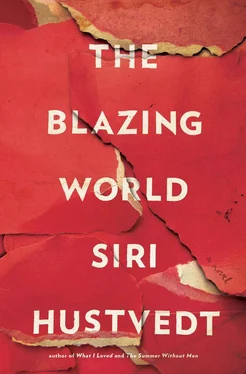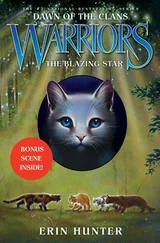Harsh ragged objects were concealed;
Oppressions, tears, and cries,
Sins, griefs, complaints, dissensions, weeping eyes
Were hid, and only things revealed
Which heavenly spirits and the angels prize.
The state of innocence
And bliss, not trades and poverties,
Did fill my sense.
It was a wonder that we found each other, Harry and I. It’s still a wonder. My Harry was a wonder.
She took me home, and when we walked into her gigantic place with the wall of windows that looked over the water, and the long blue sofas, a space that was still raw but not raw, if you see what I mean, fashionably raw, with art on one wall and floor-to-ceiling bookshelves with a couple of thousand volumes along another, and big old rugs on the floor and a shiny kitchen with pots hanging from a ceiling rack, I said to myself, it’s paradise, man, pure paradise, no cracks and crumbs and dust mites and roaches, and it’s right across the street! Then Harry showed me the studio floor right below. We walked down a flight of stairs. She flicked on some lights, and I noted the long hallway, lined with doors, one after the other, and I heard somebody snoring behind one of them. I didn’t ask. It was all going so well I didn’t want to screw it up.
Harry opened up double doors on the other side of the hall, turned on more lights to illuminate her workspace. I will not pretend that Harry’s art didn’t scare me a little. To be honest, that first night it gave me a voodoo feeling. I walked right under a flying cock, as in penis, not rooster, authentic-looking as hell, and there were several bodies in progress, at least five of the former spouse in miniature, and other figures that were life-size with clothes on, lying around like so many corpses. She had massive machines and racks of tools that reminded me of medieval torture instruments, and in the middle of the floor there was a big glass box with mirrors inside it and a couple of human shapes that gave me the willies. Louise had said there were people in the hood who called her “the Witch,” and I had said, “Come on. That’s just stupid.” But the place had an infernal quality, no doubt about it. I half expected that fire-breathing brat she had told me about at dinner to come flying out of the beams. The elegant Lady of the Coats was making some weird shit, and I confess that when I looked around that massive factory, I felt the minor character creeping up in me again. He was a shrinker, and I shrank.
Harry was so excited, she didn’t notice. She smiled and pointed at her creations and talked more fluently than she had all evening, telling me she was working through certain ideas; she wanted to represent ideas in bodies, embodied minds, and play with perceptual expectations. She liked Husserl, another incomprehensible German she probably read on the F train. I read a lot, but philosophy tires me out fast. Give me Wallace Stevens’s version of philosophy any day. She wanted me to understand. She wanted me to get it: operational intentionality. So the shrinker just nodded. Yup, Husserl, yup, good. Aha.
Okay, okay, I was intimidated. It’s one thing to be in a restaurant, in neutral territory; it’s another to wind up in the woman’s warehouse palace and discover an army of ghoulish dolls and body parts, some of which you could plug in and heat, while she chattered on about abstruse books you’d never read. When I left Harry’s studio, I had dwindled to the size of Tom Thumb and wasn’t quoting anybody. I was ready to run out of there, but Harry put her hand on my arm and said, “Bruno, you mustn’t mind me. I’m wound up because it’s so rare that I meet somebody I can really talk to. And now here you are, and I feel kind of dizzy.” That girlish look was in her face again, not sad this time, but happy.
We walked upstairs, and she put on Sam Cooke singing “You Send Me,” a song with the sweetest, dumbest lyrics and the nicest melody in the world: “Darling, you send me / I know you send me / Darling, you send me / Honest you do, honest you do.” And Harry grinned at me with her big white teeth, and she sang along and wiggled her hips and her shoulders and did a little soft-shoe. I grew back to my full stature, and once I was all grown again, I lunged. I threw my arms around her waist and buried my head between her beauteous boobs, and we didn’t stop there.
I’ll censor the juicy business that transpired between us on that first night of the bodies electric when the sparks flew and we breathed lots of red-hot fire. It had been a long time for both of us, such a long time for Harry that when it was all over, and we lay on our backs, spent and listless in her big bed, she started to cry. She didn’t make any noise except for a few sniffs. I looked over at her, and I watched the tears stream down the visible side of her face into her ear. She sat up, hugged her knees, and the tears just kept coming, leaking steadily from her ducts until I guess they finally went dry. I know when to shut up. I didn’t comment on those tears. I didn’t say a word, because I understood all about it. If she hadn’t beaten me to it, it might have been me sitting on the bed, raining tears of relief onto those clean, soft white sheets.
Maisie Lord (edited transcript)

No one could have been less like my father than Bruno Kleinfeld. When Mother told me she was seeing someone, I was happy for her, but when I first met Bruno, I was surprised. Bruno knows all this, so I’m not going to upset him. My father was immaculate; Bruno is rumpled. My father never swore; Bruno swears all the time. My father liked tennis; Bruno likes baseball. My father floated; Bruno tromps. It’s funny because Bruno is a poet, and my father was an art dealer, and the stereotypes are that poets are cloud people and business types are grounded in the nitty-gritty of trade and money. I could go on and on about their differences, but I won’t. All I know is that my mother was different with Bruno. She was freer. She told jokes, teased him, pinched his cheeks, and he gave it back to her. They reminded me of Ernie and Bert or Laurel and Hardy, a wisecracking pair of screwballs. They were embarrassing, to be honest, but you’d have to blind and deaf not to see and hear that they were in love with each other.
I think it was seeing my mother with Bruno that started me thinking about my parents again, about who they actually were, not who I thought they were. My father made mysteries around him. That was his gift, his charisma. He always made you feel that he had a secret in his pocket or a trick up his sleeve. I was his daughter, and I felt it all the time. I saw the way people were drawn to him. Like me, I think they wanted him to smile, which he did, but only now and then. Sometimes I think he held it back on purpose.
For him, art was the enchanted part of life, the part of life in which anything can happen. He especially loved painting, and he was extremely sensitive to forms and color and feeling, but he always said beauty alone wasn’t enough. Beauty could be thin and dry and dull. He looked for “thought and viscera” in the same work, but he knew that wasn’t enough to sell it either. In order to sell art, you had to “create desire,” and “desire,” he said, “cannot be satisfied because then it’s no longer desire.” The thing that is truly wanted must always be missing. “Art dealers have to be magicians of hunger.”
My father called himself a “rootless cosmopolitan” and said that he had learned how to play the part from the very best teachers — his parents. As a child, they had lived in Jakarta and Paris and Rome and Hong Kong and Bangkok. I never met my English grandfather, but my grandmother was an aristocratic Thai lady, somehow related to the royal family (which isn’t too hard, since the king always had many wives). After my grandfather died, she settled in Paris in a big apartment in the Sixteenth, with tall windows and high ceilings, and one of those cage elevators that lurches upward after you push the button. I was four or maybe five before I knew that Khun Ya was Father’s mother. I knew about my other grandparents because my mother called them Mother and Father, but Khun Ya was not like them at all. For one thing, she always glittered with jewels. For another, she moved slowly and deliberately and spoke with a British accent and had nothing to do with the grandmother I had in New York.
Читать дальше













